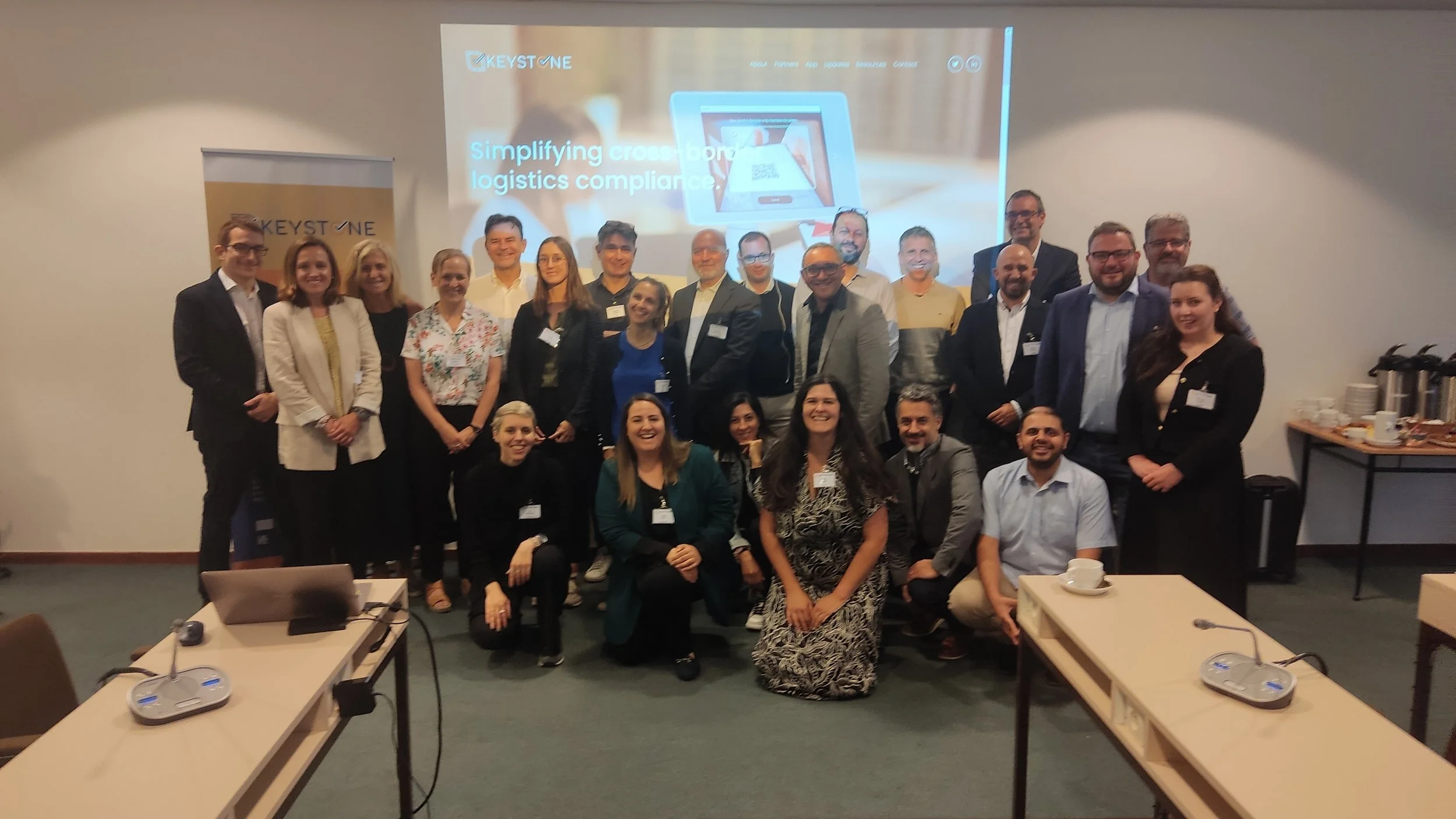KEYSTONE In Action
Newsletter Issue #1-2023
KEYSTONE In Action is the quarterly e-Newsletter of the EU-funded KEYSTONE project, which supports the digital transformation of compliance operations of both road enforcement authorities and logistics operators.
KEYSTONE project calls for participation
The consortium partners encourage operators & authorities to get involved in KEYSTONE project activities as part of our stakeholder community!
KEYSTONE's main objective is the launching of a digitalized transport web app solution that facilitates the secure and fast-track exchange of sensitive information between logistics operators and enforcement authorities at border crossings.
The project calls for the involvement of logistic operators to keep up with the ongoing and future activities of KEYSTONE, giving them the opportunity to receive valuable information and updates at the end of the project.
All members of the stakeholder community also get to exchange and take part in extensive knowledge transfer and capacity-building workshops along the project’s duration - free of charge.
Consortium gets together
The first of six General Assemblies of the KEYSTONE consortium took place in Brussels (Belgium) on 21 & 22 June 2023.
To use the time most effectively, all partners attended and used the meeting to exchange freely, brainstorm and approve decisions in an interactive and workshop-like way.
Mrs. Marjolein Salens, Project Officer Green Research and Innovation, Transport at CINEA - European Climate, Infrastructure and Environment Executive Agency and Mr. Romain Durand, Policy Officer at the Directorate-General for Mobility and Transport (DG MOVE) of the European Commission, attended the second day of the General Assembly.
We used the opportunity to remind the consortium of their contractual obligations towards CINEA, the European Commission, and European citizens at large.
KEYSTONE project kicks off
The consortium partners start the 3-year project with four initial Work Packages simultaneously.
KEYSTONE seeks to develop a universal EU-wide API standard for the secure exchange, transfer and sharing of sensitive documentation between logistics operators and enforcement authorities. This is especially needed at border crossings, where time is of the essence and multi-lingual communication often poses a problem.
Within the project, a complete web app is developed and piloted on two corridors, spanning from the North of Italy to the Benelux coastline, connecting two big economic centres of Europe.
News of Interest
Large-scale EU project to transform transport enforcement
The project develops a secure digital platform that revolutionises the transport sector across the bloc.
The Smart Enforcement Transport Operations (SETO) project aims to replace the existing fragmented landscape of enforcement platforms with a single efficient and secure gateway for transport authorities and operators in Europe.
The resulting efficiencies would yield multiple benefits for the sector and society, including simpler, quicker, and more automatic processes for enforcement agencies; faster, seamless, and more consistent requirements for transport businesses; enhanced road safety, reduced corruption, and reduced costs to consumers.
European Commission: Sustainable Transport rules to boost intelligent transport systems for safer and more efficient transport agreed
The agreement is a milestone on the way to making connected & automated mobility a reality
Securing a national border requires a delicate balance of effectiveness and efficiency.
The European Commission welcomes the political agreement reached between the European Parliament and the Council on a proposal made by the Commission in 2021 on the revision of the Intelligent Transport Systems (ITS) Directive.
The revised law will make high-quality and timely data available for services such as multimodal journey planners and navigation services.
A smarter and interoperable transport system will allow the more effective management of traffic and mobility across transport modes, enabling users to better combine the most sustainable modes of transport.
DXL Technology (US): How advanced technologies can empower smart border checkpoints
Every border agency, no matter where it’s located in the world, strives to achieve a harmony between two vital but often conflicting goals: one, to ensure the highest possible levels of border security; and two, to move travelers along as quickly and efficiently as possible.
This balancing act can present border agencies with serious challenges.
On one hand, ensuring security takes time; on the other, delays can be extremely costly. Security is time-consuming because documents, vehicles and cargo all need to be carefully checked; travelers’ identities need to be accurately verified; and rules and regulations need to be scrupulously followed.
Yet if the process takes too much time, a border agency can not only frustrate travelers but also run up huge costs.








